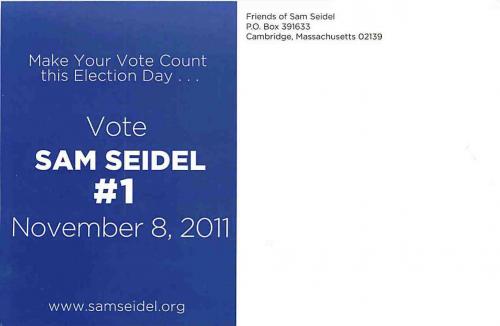It was election day here yesterday, and in the run-up I came home to a front porch blanketed with postcards and flyers from various City Council candidates (there were a whopping 18 for our hamlet of Cambridge — enough flyers to cover some meaningful real estate on my little porch).
Now that the election has passed, I feel free to post a picture of one them, the biggest in size. Here's the front and the back:


Sam Seidel asked for my vote. In big letters. He cared enough to cut down all those trees and spend campaign funds on the printing costs and send out volunteers to drop these postcards all over my neighborhood. But all it had to say was: "Sam Seidel #1." His campaign people couldn't come up with one measly reason WHY I should vote for him? Not one thing that set him apart, or his #1 issue? Not one bullet point? Not a single Big Hairy Audacious Goal? Or even a small, epilated, modest one? There was plenty of room on that big postcard to list one substantive and important thing about himself.
It turns out he did have some goals. They're all on this website. Take a look at his goal #1:
1. Education. Early childhood education is the next big challenge that is before us as a community. Having successfully worked with school committee member Nancy Tauber on Out of School Time opportunities for middle school students in Cambridge during my last term on the Council, my next major priority is to work to expand early childhood options in Cambridge for our city's children. A lot of good work has already happened in this area, and all research shows that there is no better investment in the education of a child than in those earliest years, specifically 0 to 3, where so much crucial brain development happens. This should be a top priority for the city moving forward.
This goal is worded so vaguely as to tell us very little. Childhood education should be a priority for the city? That's nice, and not very helpful. It's the equivalent of telling a law school admissions officer that you want to effect change by promoting justice for all. It's just not specific enough. (His goals #2 and #3 do a better job with specifics.) If that's his #1 goal, it would have been better for him to use the word count on that web page to flesh out his vision more specifically and present some concrete goals he'll hold himself accountable for, rather than moving on to a superficial list of 15 other issues he cares about, everything fom parking to university relations to sustainability to public art. And his postcard could have positioned him as the #1 champion of early childhood education in Cambridge.
You might be wondering why I'm blogging about this. I've got nothing against Sam Seidel. (His competitors' flyers were also pretty lousy.) I'm sure he's a fine person and, if elected, would have made a fine city council member. Or not. The point is, his flyer had zero influence on my opinion of him, other than that he needs to do a better job positioning himself and making someone want to vote for him. I'm picking on Sam Seidel and on his gigantic postcard because I see a teachable moment for applicants. (Yes, when you're a hammer, everything does look like a nail!)
When you want someone to vote for you over all the others, it's your job to distill something important about yourself in a concrete way.
That's how you stand out.
This slush pile of candidate postcards reminds me an awful lot of the slush pile of applications I used to wade through as an admissions officer. Telling an admissions officer some slogan about how you'd make a "valuable addition to the incoming class" actually says nothing at all if you don't explain HOW. It's the equivalent of saying "Vote Sam Seidel #1." All that white space on the postcard, all that word count in your essays: don't waste it. Similarly, those essays that are way too long and are nothing more than superficial lists of this goal and that accomplishment... those are just as hard to read as that candidate website.
So if you're an applicant, don't follow that model of campaigning. Have something meaningful to say, and distill it. Don't just tell people to admit you. Persuade them to. And make sure you've given the decision maker enough to remember you by when she gets to the voting booth / committee meeting.
Former Dean of Admissions at the University of Chicago Law School and a recovering lawyer, Anna Ivey founded Ivey Consulting to help college, law school, and MBA applicants navigate the admissions process. You can find more admissions tips in The Ivey Guide to Law School Admissions. Join the conversation here in the blog comments and on Twitter and Facebook, or email us a new question for the blog.
